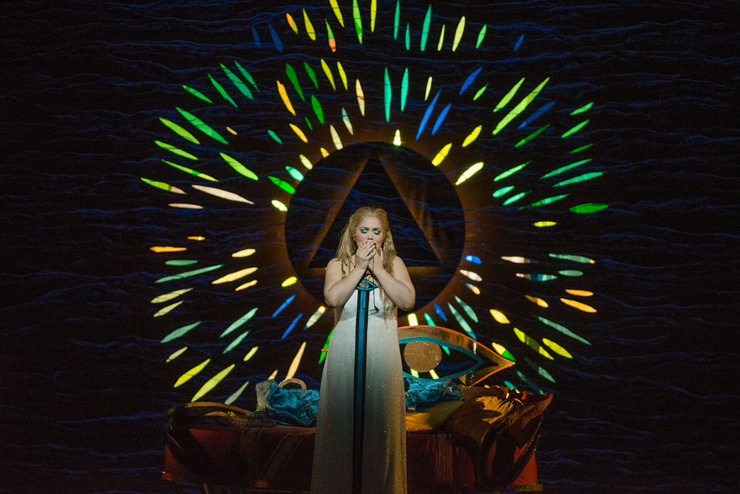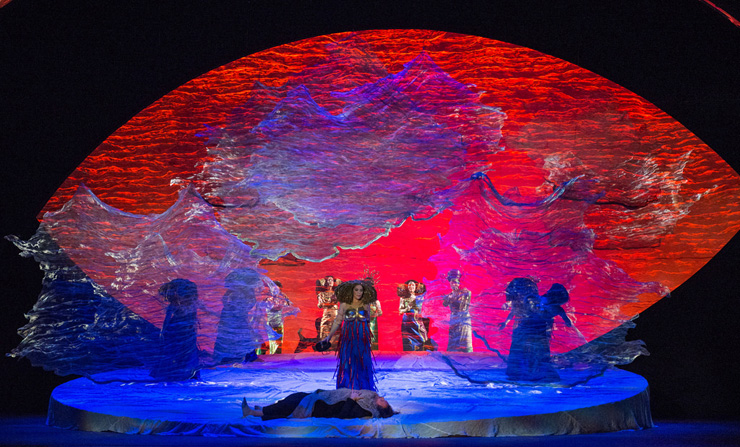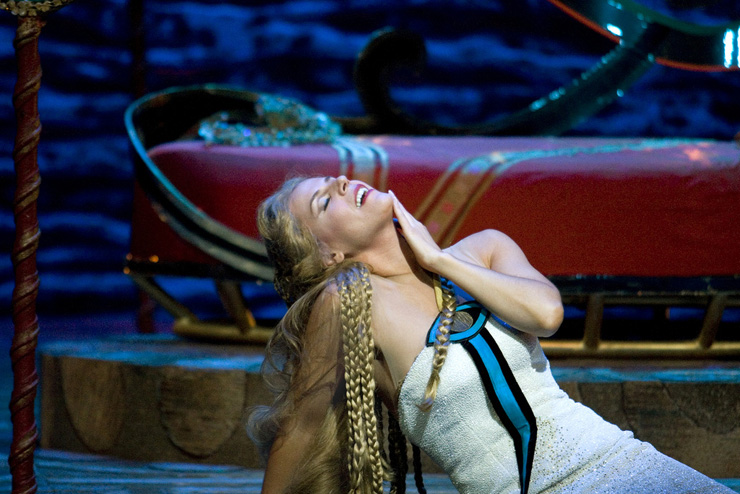When the best known piece from an opera is the voice of a violin, you might think, “huh?”
This is the case with Jules Massenet’s Thaïs, an opera which was last presented by Florida Grand Opera in 1976.
Now you think you’ve got it figured out – since a solo violin claims the most memorable tune, the arias must not be very good.
In fact, the arias and duets are strong and melodic.
Now you’re perplexed and wonder why Thaïs is not performed as part of the standard operatic repertoire. The answer may not be obvious as Massenet was one of the most prolific and revered composers of French opera during his lifetime. With over 30 extant operas in his canon, there was hardly a time in the late 19th and early 20th centuries when one of his operas was not playing to packed houses.

Photographer: Justin Namon/ra-haus fotografie
Thaïs, with a French libretto by Louis Gallet, based on the Anatole France novel of the same name, premiered in Paris in 1894. Apparently France based his work on a biography penned by a German nun memorializing the true life of Saint Thaïs of Alexandria, purported to have been the highest paid Courtesan in town, and who converted to Christianity. France shared the sentiment of many of his countrymen, bearing great hostility toward the Roman Catholic Church, and his novel afforded him the opportunity to stick it to the clergy. What a great vehicle for an opera!
Opening Saturday night, May 3 (this review was from a performance seen on May 6) at the Adrienne Arsht Center, FGO presented Massenet’s tale of religious fanaticism crashing into eroticism. Or, boy meets girl and they swap values.
Massenet’s opera is cinematic and seductive, composed from his imagination, not a piano keyboard.
The overture, sounding like a romantic film score, unfolded with winds on a bed of strings. Individual wind instruments suddenly sharing the melody with some 14th century monks on the banks of the Nile.
Athanaël (a tall and trim Kristopher Irmiter), anuber-ascetic monk, established his big baritone immediately (“Hélas, enfant encore”), lyrically and powerfully remembering the famous courtesan Thaïs, whom he met years earlier in Alexandria – a city fallen into colossal sin. He decided his mission is now to convert Thaïs to Christianity. The Father Superior Palémon (bass Adam Lau) warned him of the dangers of mingling with worldly people, Lau’s basso cavernous and calm.
Athanaël dreamed of Thaïs and seductive women dancing erotically for him (“Toi qui mis la pitié”), taking it as a sign. The chorus of monks behind him blended well, a pianissimo chant beautifully harmonized as Athanaël set off for Alexandria.

Photographer: Justin Namon/ra-haus fotografie
The FGO orchestra, under the nimble baton of Ramón Tebar, launched into lively strides, suggesting Athanaël’s elevated mission. Columns lowered from the fly loft onto the stage as Athanaël arrived at the home of an old friend Nicias (tenor Martin Nusspaumer), a handsome, energetic and wealthy Alexandrian nobleman who had rented out Thaïs for the week. Athanaël zealously sang of the seductive lure of the city and its temptations (“Voilá donc la terrible cite”), then bantered with Nicias, Nusspaumer easing into his tenor notes smoothly and naturally.
Two servants of Nicias, Crobyle (soprano Riley Svatos) and Myrtale (mezzo-soprano Caitlin McKechney) blended their voices impeccably, playfully dressing Athanaël up with a colorful gilded robe and golden sandals in prep for the party where he would see Thaïs.
A glamorous blond soprano (Eglise Gutiérrez) brought a large voice to Thaïs, her notes both vast and subtle. She often moved from a strong bottom to her top, arriving in her upper register before the audience realized she had arrived there. She and Nusspaumer were soulful in their duet on their last night together,both exuding warmth, blending prayerfully with Massenet’s romantic music.
Thaïs noticed Athanaël staring at her, discovering that he wanted to teach her to denounce the flesh and seek pain. Not much traction there. Gutiérrez emoted sensually (“Qui te fiat si sévère”), fending off Athanaël’s accusations of blasphemy and questioning the monk if he had ever felt the desire to be loved and kissed. The chorus raised the stakes. Athanaël told her he would come to visit and save her – she scoffed at him, warning him to be careful of taking on Venus, the goddess of love. She humiliated him by disrobing and flashing a golden bra. (The American soprano Sibyl Sanderson, who originated the role, apparently flashed her breasts at the monk, and by proxy, the audience, during the Paris premier.)
Thaïs reflected on how she was not getting any younger,fearing that she would no longer be able to rely on her beautiful assets to coast through life. She sang into her looking glass (“Dis-moi que je suis belle”), asking her mirror, “Tell me that I am beautiful, forever!” The aria ended on a high D-flat, a difficult note to essay for a soprano. Gutiérrez’s remarkable facility was strong in her lower register, and she was most at home caressing her high notes. However, when the score required her to attack the power note on top, her voice became shrill.
Thaïs told Athanaël that she was afraid of death. He stated to her that if she gave herself to God, she would have eternal life.

Photographer: Justin Namon/ra-haus fotografie
Just before the Méditation, playing with great intensity and volume, the violins released, and the harp (Kay Kemper) played beautiful chords. The solo violin (Concertmaster Scott Flavin) arrived peacefully, sailing with ecstasy into a huge level of calm. The piece gave the illusion that it was never-ending. Flavin was flawless in his rendering of the famous intermezzo, folding the softs and the louds together with great skill and sensitivity.
Not only Thaïs, but the musicians and the audience were transformed.
Thaïs decided to convert and Athanaël (and oboe, Robert Weiner, and English horn, Shane Wedel) indicated to her the convent across the desert. Athanaël told Thaïs that she must torch her house and burn all her possessions. Gutiérrez sang honestly, with sweet emotion (“L’amour est une vertu rare”), wanting to keep a small statue of Eros, a personal symbol of love.
Joining the chorus mob, FGO became an ominous character with explosive percussion and a trilling flute (Nadine Asin) as Athanaël and Thaïs made their way through the crowd for the desert.
Athanaël led her across the hot sands and demanded that she press on as penance for her sins even though she was sapped from exhaustion. He felt remorse when he noticed her bleeding feet and retrieved some water for her from an oasis. They shared a sweet moment, Thaïs recounting the events that had brought them together (“O messager de Dieu”), Gutiérrez singing passionately and beautifully, sneaking up behind her high notes with aplomb. She and Irmiter duetted, sharing sweetly their souls.
Realizing he will never see Thaïs again, a saddened and reluctant Athanaël turned her over to the nuns. Irmiter, alone on stage, his dramatic baritone in anguish, sang against the full string section, the Méditation motifunderscoring his despair.
Back at the monastery, Athanaël was haunted by visions of Thaïs – he sees her everywhere! (“Tu sais, Ô Palémon”). He braved a massive storm through the desert, arriving at the convent to find Thaïs hours away from death. Irmiter and Gutiérrez sang gloriously in counterpoint to the Méditation reprise.
Athanaël confessed to her that “everything I told you was a lie – the only thing that matters is the love on earth between human beings.”
Thaïs and the orchestra ascended and fell, she died in ecstasy, and the monk was broken forever, crying out for pity – realizing his fervor was driven not by religion, but lust.

Photographer: Justin Namon/ra-haus fotografie
A fine mezzo-soprano Raehann Bryce-Davis played Albine (Mother Superior), bass Carlton Ford was a servant, and the chorus, under the expert direction of Chorus Master Michael Sakir, morphed into Cenobites, Comedians, Philosophers, Townspeople, and Nuns.
Stage Director Renaud Doucet managed his stage well. Set Designer André Barbe created the minimal set with an “eye” theme – “the way the outside world looks at Thaïs, the way Athanaël looks at her and God, the way Thaïs looks at herself.” The early scenes used ovals with mirrors at their centers atop sticks to surround Thaïs. The oval stage platform, in the style of the Greek Bas-reliefs and Egyptian hieroglyphics, was raked so as to enhance the action.
Lighting Designer Guy Simard made good use of an eye-shaped scrim backdrop – lit orange for the desert, the monk running behind a blue scrim during the storm.
Costume Designer André Barbe presented ancient Byzantine and Egyptian styles that befitted this mixed population; wig and makeup was by designer Christopher Diamantides.
Thaïs is sung in French with projected titles in English and Spanish
Miami Adrienne Arsht Center / Ziff Ballet Opera House
May 10, 2014, at 8 p.m.
(Thaïs will be played by Angela Mortellaro.)
Fort Lauderdale Broward Center for the Performing Arts / Au-Rene Theater
May 15 & 17, 2014, at 7:30 p.m.
(Thaïs will be played by Eglise Gutiérrez.)
www.FGO.org




